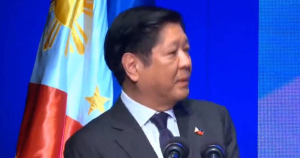
President Ferdinand “Bongbong” Marcos Jr. Screengrab from RTVM Facebook Live
TOKYO— The Philippines is considering a tripartite agreement with its two close allies, the United States and Japan, amid the “dangerous situations” the country faces, President Ferdinand “Bongbong” Marcos Jr. said.
Interviewed by Japan’s Kyodo News Friday, the President said one of the “many other issues” raised by the Philippine delegation during his visit to Tokyo was creating alliances with its long-time partners.
“It is something that we certainly are going to be studying upon my return to the Philippines. I think just part of the continuing process of strengthening our alliances because in this rather confusing,” he said.
Marcos mentioned “dangerous situations” threatening the country.
“I’m not talking only about the South China Sea, I’m not only talking about the Indo-Pacific region but, of course, there is a conflict still ongoing in Ukraine and the rather disturbing effects that it has all around the world,” he said.
Forging alliances is “a central element to … providing some sort of stability in the face of all these problems that we are seeing us,” Marcos said.
The President and Japanese Prime Minister Fumio Kishida earlier agreed to beef up Manila and Tokyo’s defense and security relations.
The Japanese Embassy in Manila said in a statement Marcos and Kishida have “concurred to advance consideration to promote cooperation in defense equipment and technology as well as trilateral cooperation among Japan, the United States and the Philippines.”
In a joint statement on Friday, February 10, the two leaders resolved to “increase the defense capabilities of their own countries, and further strengthen overall security cooperation.”
This will entail strategic reciprocal port calls and aircraft visits, the transfer of more defense equipment and technology, continuous cooperation on previously-transferred defense equipment, and capacity building, the embassy said.
However, he pointed out that the government must first ensure the responsibility of protecting and promoting the country’s national interest.
Sen. Francis Tolentino, vice chairman of the Committee on Foreign Relations, said the Senate should be given the opportunity to fine-tune the dynamics of such an arrangement while recognizing the role of the president in setting the country’s security and foreign relations agenda.
Marcos and Kishida also welcomed the signing of the terms of reference concerning the Humanitarian Assistance and Disaster Relief Activities of the Japan Self-Defense Forces in the Philippines, and agreed to continue finding ways to carry out joint exercises between their countries.
They also agreed to further advance cooperation in economic security, cybersecurity and other fields.
Kishida said Japan intends to continue supporting the institution of an autonomous government in Bangsamoro in ways commensurate to the peace process, and to extend cooperation in the Sulu–Celebes Seas and the surrounding areas.
Marcos expressed his deep appreciation for Japan’s continued support to the Mindanao peace process.
WITH PNA
